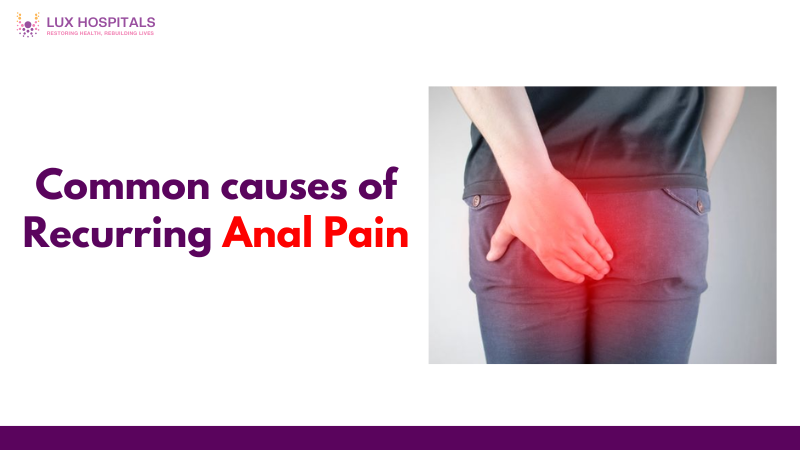Common Causes of Recurring Anal Pain

Recurring anal pain can be uncomfortable, distressing, and even embarrassing to talk about but it’s more common than most people think. If you’re experiencing recurring anal pain, it’s important to understand the possible causes and know when to seek help. Whether it’s a mild irritation or a sharp, stabbing sensation, recurring anal pain should never be ignored.
Recurring anal pain can be uncomfortable and concerning. Understanding its common causes helps identify issues early and seek appropriate treatment.
Causes of Recurring Anal Pain
Understanding what may be causing your Recurring Anal The first step to a successful treatment is pain. Here are some common causes:
1. Anal Cracks
Tiny rips in the anus’s lining are frequently brought on by straining during bowel motions or passing firm stools. They cause sharp pain and bleeding.
2. Hemorrhoids
Swollen veins in the rectal area can lead to burning, itching, and Recurring Anal Pain, especially when sitting or after bowel movements.
3. Proctalgia Fugax
A sudden, severe spasm of the anal muscles that causes temporary but intense pain. While it’s harmless, it can be alarming due to its sudden onset.
4. Chronic Constipation
Frequent straining can irritate the anal muscles and tissues, leading to Recurring Anal Pain and even fissures or hemorrhoids.
5. Pelvic Floor Dysfunction
When the muscles in your pelvic floor don’t function properly, it can result in chronic pain in the anal and rectal area.
6. Infections or Abscesses
Bacterial infections, sexually transmitted infections (STIs), or anal abscesses can lead to inflammation and persistent discomfort.
7. IBD, or inflammatory bowel disease
Conditions such as either ulcerative colitis or Crohn’s disease can inflame the rectal area, contributing to Recurring Anal Pain.
Symptoms That May Accompany Recurring Anal Pain
- Bleeding during or after bowel movements
- Swelling or lumps near the anus
- Itching or burning sensation
- Mucus discharge
- Constipation or difficulty passing stools
- Sharp or throbbing pain that disrupts sleep
If you notice any of these symptoms along with Recurring Anal Pain, consult a healthcare provider to determine the underlying cause.
When to See a Doctor?
Do not ignore Recurring Anal Pain, especially if:
- The pain lasts longer than a few days
- There is noticeable bleeding
- Pain worsens with time
- It interferes with your daily life or sleep
- You experience fever or chills (signs of infection)
Accurate diagnosis is necessary for the right course of treatment. To find the cause, a physical exam, digital rectal exam, or imaging tests may be required.
Everyday Tips to Manage Recurring Anal Pain
These practical methods can help lower recurring anal pain:
1. Comfortable Sitz Baths
To relax the anal muscles and lessen inflammation, many times a day, soak in warm water for 15 to 20 minutes. Many times a day.
2. High-Fiber Diet
Eating more fiber helps soften stools and reduce the need for straining, preventing further irritation.
3. Stay Hydrated
Drinking plenty of water improves digestion and reduces the chances of constipation.
4. Avoid Prolonged Sitting
If your job involves sitting for long hours, try using a cushion or a standing desk to relieve pressure.
5. Topical Creams
Over-the-counter ointments for hemorrhoids or fissures can provide temporary relief from Recurring Anal Pain.
Conclusion
Ignoring recurrent anal pain may result in consequences and worsened symptoms. Early detection and treatment are crucial for any ailment, whether it’s a small one like hemorrhoids or a more serious one like IBD. Listen to your body and take the required actions to live a better, pain-free life instead of suffering in silence. Recurring anal pain is a common but often overlooked issue that can stem from various causes, both minor and serious.
Frequently Asked Questions
Recurring anal pain is often caused by hemorrhoids, anal fissures, muscle spasms (proctalgia fugax), infections, or inflammatory bowel conditions. Stress, poor diet, and prolonged sitting can also trigger or worsen the pain over time.
Although rare, recurring anal pain can sometimes be a symptom of anal cancer, especially if accompanied by bleeding or a lump. It’s essential to consult a healthcare provider for proper evaluation and early detection.
Doctors use a combination of physical exams, rectal inspections, digital palpation, and sometimes imaging tests like anoscopy or colonoscopy. A detailed history of symptoms helps in narrowing down the underlying cause effectively.
Yes, mild anal pain can be managed at home with sitz baths, stool softeners, high-fiber diets, and topical treatments for relief. However, persistent or worsening symptoms should be assessed by a medical professional.
Occasional anal pain may be normal due to constipation, strain, or minor injury, but frequent pain isn’t typical. Recurrent discomfort may indicate an underlying issue that needs proper medical attention.




















